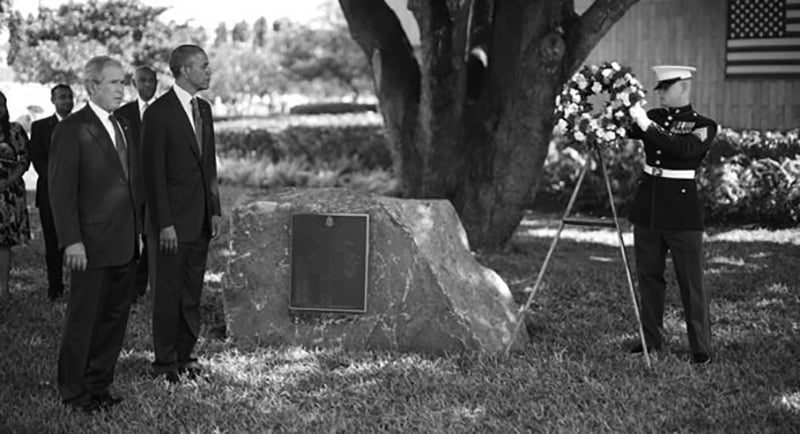Lessons Learned: Analyzing the Impact and Implications of the Attacks on US Embassies in Kenya and Tanzania
In this article, we delve deep into the tragic events that unfolded on August 7, 1998, when US embassies in Kenya and Tanzania were targeted in simultaneous bomb attacks. The impact of these attacks on US embassies in Kenya and Tanzania was not only devastating in terms of loss of life and physical damage, but it also sent shockwaves across the globe, highlighting the vulnerabilities of diplomatic missions and raising important questions about international security.
Embarking on a reflective journey, we analyze the long-lasting implications of these terrorist attacks on us embassies in Kenya and Tanzania , examining how they reshaped US foreign policy, fortified counterterrorism strategies, and influenced global perceptions of terrorism. Drawing on historical records, expert interviews, and academic research, we aim to shed light on the valuable lessons learned from the tragedies that still resonate today.
Join us as we navigate through the complexities surrounding the attacks on US embassies in Kenya and Tanzania , to gain a comprehensive understanding of their impact on international relations and the ongoing fight against terrorism. This article presents a profound exploration of an event that forever changed the course of history.
Background Information on the Attacks

The terrorist attacks on US embassies in Kenya and Tanzania were meticulously planned and executed by Al-Qaeda, a terrorist organization founded by Osama bin Laden. On August 7, 1998, two truck bombs exploded outside the US embassies in Nairobi, Kenya, and Dar es Salaam, Tanzania. The blasts killed 224 people, including 12 Americans, and injured thousands more.
These attacks on US embassies in Kenya and Tanzania marked a significant turning point in the history of terrorism, demonstrating the ability of extremist groups to strike at the heart of global powers. The bombings exposed the vulnerabilities of diplomatic missions and raised urgent concerns about the security measures in place to protect them. The devastating loss of life and infrastructure created shockwaves across the world, triggering a reevaluation of counterterrorism strategies and international security cooperation.
Impact of the Attacks on the US Embassies
The impact of these terrorist attacks on US embassies in Kenya and Tanzania cannot be overstated. Not only did they result in a significant loss of life and infrastructure, but they also had far-reaching consequences for US foreign policy. The bombings served as a wake-up call for the United States, forcing a reassessment of its diplomatic missions and the need for stronger security measures.
The attacks on US embassies in Kenya and Tanzania also led to a shift in public opinion, both domestically and internationally, regarding the threat of terrorism. The images of the destroyed embassies and the stories of the victims resonated deeply with people around the world, highlighting the brutal nature of extremist ideologies. The bombings served as a catalyst for increased global cooperation in the fight against terrorism, as countries recognized the need to work together to prevent such atrocities in the future.
Analysis of the Implications for US Foreign Policy
The terrorist attacks on US embassies in Kenya and Tanzania had profound implications for US foreign policy. In response to the bombings, the United States adopted a more assertive approach to counterterrorism, with a particular focus on dismantling Al-Qaeda and preventing future attacks. This marked a significant shift in US foreign policy, as the nation recognized the importance of addressing the root causes of terrorism and working collaboratively with other countries to combat the threat.
Furthermore, the attacks on US embassies in Kenya and Tanzania highlighted the need for improved intelligence sharing and cooperation between nations. The United States recognized that a global response was required to effectively combat terrorism, leading to the establishment of new information-sharing networks and the strengthening of existing partnerships. These measures aimed to enhance the ability to detect and prevent future attacks, ensuring the safety of diplomatic missions and their personnel.
Lessons Learned from the Attacks

The terrorist attacks on US embassies in Kenya and Tanzania served as a catalyst for important lessons learned in the fight against terrorism. One of the most significant lessons was the need for proactive intelligence gathering and analysis. The bombings exposed gaps in intelligence capabilities, highlighting the importance of identifying and acting upon potential threats before they materialize.
Additionally, the attacks on US embassies in Kenya and Tanzania underscored the importance of investing in diplomatic security. The bombings revealed weaknesses in the physical security measures at embassies, prompting a reassessment and upgrade of security protocols. This included the implementation of state-of-the-art surveillance systems, the deployment of highly trained security personnel, and the establishment of stringent access control measures.
Security Measures Implemented after the Attacks
In the aftermath of the terrorist attacks on US embassies in Kenya and Tanzania, the United States implemented a range of security measures to prevent future incidents. These measures aimed to enhance the protection of diplomatic missions and their personnel, while also addressing the broader threat of terrorism. Some of the key security measures implemented included:
- Strengthening physical security: The bombings prompted a comprehensive review of the physical security measures at US embassies worldwide. This resulted in the implementation of enhanced blast-resistant construction techniques, reinforced perimeter barriers, and the installation of advanced surveillance systems.
- Improving intelligence capabilities: The attacks highlighted the need for improved intelligence sharing and analysis. As a result, the United States invested heavily in enhancing its intelligence capabilities, including the development of advanced surveillance technologies and the expansion of information-sharing networks with partner countries.
- Enhancing diplomatic training: The bombings served as a reminder of the importance of diplomatic training in high-risk environments. The United States implemented rigorous training programs for diplomats and embassy personnel, focusing on security protocols, threat assessment, and crisis management.
International Response to the Attacks

The attacks on US embassies in Kenya and Tanzania prompted a strong international response, with countries around the world expressing solidarity with the United States and condemning the acts of terrorism. The bombings served as a stark reminder of the global nature of the terrorist threat, leading to increased cooperation between nations in the fight against terrorism.
The terrorist attacks on US embassies in Kenya and Tanzania also spurred the United Nations to take a more proactive role in addressing the issue of terrorism. The Security Council adopted Resolution 1267, which called for the imposition of sanctions on individuals and entities associated with Al-Qaeda and the Taliban. This marked a significant step towards international consensus on the need to combat terrorism collectively.
The Long-Term Effects of the Attacks on US Foreign Relations
The attacks on US embassies in Kenya and Tanzania had long-term effects on US foreign relations. The bombings strained diplomatic ties with the affected countries, as well as with other nations that were grappling with the threat of terrorism. However, the attacks also served as a catalyst for increased cooperation and collaboration, as countries recognized the shared nature of the terrorist threat.
The United States worked closely with partner nations to strengthen counterterrorism efforts and enhance intelligence sharing. This led to the development of new alliances and partnerships, which have been instrumental in preventing future attacks and disrupting terrorist networks. The terrorist attacks on US embassies in Kenya and Tanzania served as a turning point in US foreign relations, shaping the way the nation engages with the world in the post-9/11 era.
Similar Incidents and Their Relevance to the Attacks on US Embassies

The attacks on US embassies in Kenya and Tanzania were not isolated incidents. They were part of a broader pattern of terrorist attacks targeting diplomatic missions and symbolically significant targets. Similar incidents, such as the 2012 attack on the US consulate in Benghazi, Libya, and the 2019 attack on the US embassy in Baghdad, Iraq, have highlighted the ongoing threat to diplomatic missions worldwide.
These incidents as well as the terrorist attacks on US embassies in Kenya and Tanzania underlined the importance of continuously evaluating and strengthening security measures at diplomatic facilities. They also serve as a reminder of the need for robust intelligence capabilities and close collaboration between countries to effectively counter the evolving threat of terrorism.
Moving Forward from the Attacks on US Embassies in Kenya and Tanzania
The attacks on US embassies in Kenya and Tanzania were tragic events that had a profound impact on international relations and the ongoing fight against terrorism. They reshaped US foreign policy, fortified counterterrorism strategies, and highlighted the need for global cooperation in combating terrorism.
Through careful analysis of the implications and lessons learned from these terrorist attacks on US embassies in Kenya and Tanzania , we can gain a comprehensive understanding of the challenges and opportunities that lie ahead. By continuously adapting and strengthening security measures, investing in intelligence capabilities, and fostering international collaboration, we can move forward with confidence in the face of the evolving threat of terrorism.
Let us remember the victims of the attacks on US embassies in Kenya and Tanzania and honor their memory by remaining vigilant, resilient, and united in our commitment to a safer and more secure world.
For more articles related to Politics in Tanzania, click here!


































